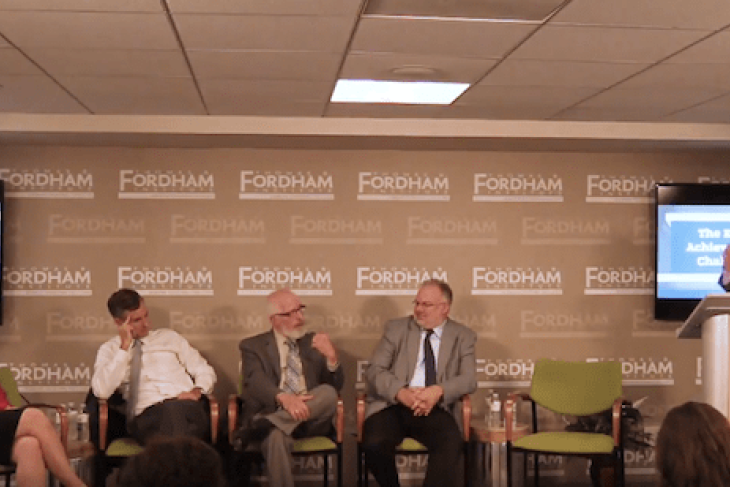Now that states have submitted plans to the U.S. Department of Education as part of their obligations under the Every Student Succeeds Act, what happens next? And which states are most likely to see significant achievement gains in the coming years?
To answer these questions, Fordham hosted “The ESSA Achievement Challenge,” an event featuring Matthew Ladner, senior research fellow at the Charles Koch Institute (representing Arizona); Candice McQueen, commissioner of the Tennessee Department of Education; Glen Price, chief deputy superintendent of public instruction for the California Department of Education; and John White, state superintendent of the Louisiana Department of Education. Each made the case that their respective state’s plan will lead to the greatest student success.
We kicked off the festivities by asking the audience to vote for the state most likely to make significant progress in the years ahead, and Louisiana won out. But would this hold up after each state’s defense?
Going first, Matthew Ladner focused on Arizona’s prioritization of school choice. First highlighting the positive impact of competition on all schools, he described what he called, “Arizona’s virtuous K–12 cycle,” with parental choice leading low-performing schools to shutter and high performing ones to replicate. While illustrating the progress Arizonan students have made on the National Assessment of Educational Progress, he emphasized that “when you're leading the nation in academic gains, you must do no harm and keep the momentum going.”
Second up, California Chief Deputy Superintendent Glen Price underscored that “the California way is to focus on stakeholder engagement, working to support continuous improvement and ambitious goals." He explained the supportiveness of the state’s approach to its diverse population of schools. California’s funding formula—which provides LEAs broad discretion for how they’ll spend money—provides the overall context for its ESSA plan, emphasizing its key elements: rigorous standards and assessments, funding equity, a strong and transparent accountability system, continuous improvement, and a differentiated system of school supports. California’s dashboard approach to accountability is not without its critics, as some groups such as Fordham and Bellwether Education Partners have pointed out that it could mask underperformance. However, Price stressed that California is “not going to boil it down to a single test score—we're going to look at the whole child."
John White, Louisiana’s state superintendent, opened his presentation by arguing that we should approach our educational challenges through the context of history, acknowledging Louisiana’s own history of slavery and segregation, while also recognizing the differences between not only the states, but also the big cities and small towns within the states. Making the case for his focus on curriculum reform in Louisiana, White expressed that “absent a strong curriculum, strong standards means nothing.” White also explained how midsized cities and rural populations, who can be overlooked by state leaders, will be a significant focus under Louisiana’s plan, addressing the issues of workforce, curriculum, early education, CTE, and funding. He also explained how the scale of Louisiana in comparison to larger states such as California necessitated a different, more personal approach. And he concluded his presentation by saying that "Louisiana's kids are just as capable as any other kids in America—they deserve a system that draws from the most promising practices in the most promising states."
For Tennessee, Commissioner Candice McQueen said that, over the next ten years, the Volunteer State would be growing on a strong foundation, aligning curriculum to expectations, and increasing accountability and opportunities. Highlighting Tennessee’s stable, proactive leadership on both sides of the aisle, she called attention to how the state is building on governance lessons, innovations, and interventions, saying “we've set up opportunities for over one million students every year in our state.”
At the conclusion of the event, the audience was again polled to see which state seemed the most likely to boost achievement, and this time around Tennessee was victorious. Overall, each of the panelists demonstrated the hard work that’s culminated in their state’s ESSA plan, as well as the great potential that each represents for student outcomes. They made clear that—in at least Arizona, California, Louisiana, and Tennessee—there are capable leaders, concrete ideas, and promising approaches to be put into action.

